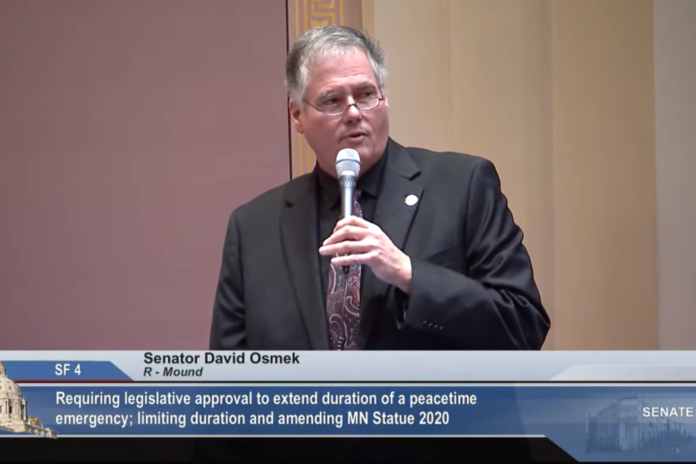The Minnesota Senate passed a bill Monday that would require future extensions of peacetime emergencies to be voted on and approved by the Legislature.
The bill was passed on a tripartisan vote, with two Independents, Sens. Thomas Bakk and David Tomassoni, and two Democrats, Sens. Kent Eken and John Hoffman, voting in favor of the bill.
Sen. David Osmek, R-Mound, chief author of SF 4, said at a press conference that the imbalance between the three branches of government has become “obvious” throughout the past year of Gov. Tim Walz’s use of emergency powers.
“This legislation helps define the window of ‘emergency,’ making it clear that after 30 days, it’s time to work with the Legislature,” Osmek said.
His new bill “makes us partners in the emergency,” he added.
The bill would require the executive branch to secure a majority vote in both the House and Senate in order to extend an emergency beyond 30 days.
Additionally, the bill specifies that the governor is not allowed to let his powers expire and then declare “a new peacetime emergency for the same emergency” as a way of avoiding the legislative vote.
Current law allows the executive branch to extend peacetime emergencies indefinitely for 30 days at a time but only grants the Legislature the option to cancel an emergency declaration.
While discussing his bill on the Senate floor Monday, Osmek cited Walz’s “demands letter” from earlier this year, in which the governor demanded the Legislature do his bidding before relinquishing his powers.
“You could make the case [that] it’s extortion of the legislative branch,” Osmek argued.
Republican Sen. David Osmek accuses Gov. Walz of extorting the Legislature with a list of demands he wants met before giving up his emergency powers. pic.twitter.com/UFJJ8iQPG4
— Alpha News (@AlphaNewsMN) March 15, 2021
Senate Majority Leader Paul Gazelka, R-East Gull Lake, said emergency powers were logical at the beginning of COVID-19, but now the balance of power has shifted completely to the executive branch and “eroded” trust between the branches.
“40 states are looking at changes to emergency powers. This bill puts the Legislature back at the table to find common ground, mutual agreement, and better serve the entire state,” Gazelka said.
According to the National Conference of State Legislatures and a news release from the Senate Republican Caucus, 40 states are reevaluating their governors’ emergency powers and considering measures to limit executive control.
Walz’s emergency powers have been in effect for over a year; he first declared an emergency in response to the COVID-19 pandemic on March 13, 2020.










